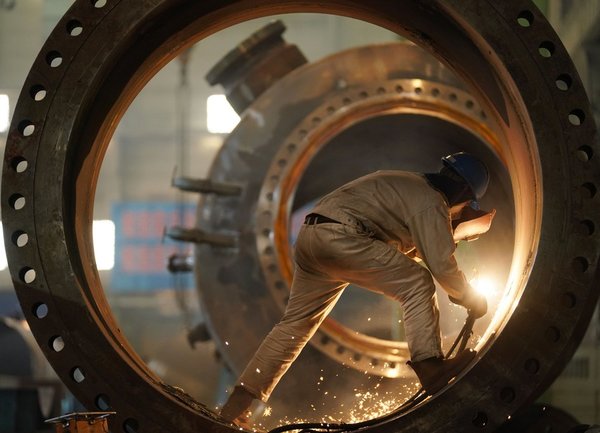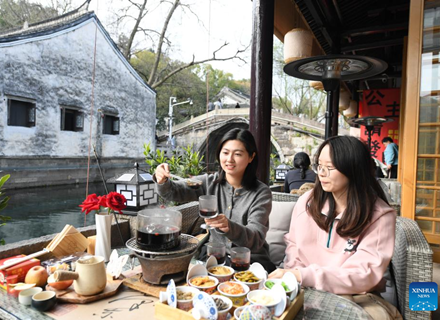Xi Focus: China's Endeavor to Maintain Economic Growth amid COVID-19 Fight
 |
| A worker works at a factory of Harbin Boiler Company Ltd. of Harbin Electric Corporation in Harbin, northeast China's Heilongjiang Province, on April 14, 2022. [Xinhua/Wang Jianwei] |
BEIJING, April 20 (Xinhua) — Since the start of the COVID-19 epidemic over two years ago, China has been striving to maintain a balance between safeguarding public health and mitigating the epidemic's impact on economy.
Chinese President Xi Jinping, also general secretary of the Communist Party of China (CPC) Central Committee and chairman of the Central Military Commission, has personally taken charge of planning and directing the COVID-19 response to lead the country in curbing the spread of the virus and minimizing the impact of the epidemic on the economy.
Currently, China is stepping up its efforts to contain the outbreak of the fast-spreading variant Omicron and cope with the ensuing downward economic pressure.
Though the virus is evolving rapidly, the principles proposed by Xi to secure the well-being of the people are more relevant than ever, especially in terms of finding the right solutions to swiftly overcome current challenges.
People First, Life First
Each and every life counts. Ever since the epidemic began, Xi has put the health and safety of the Chinese people before everything else, fortifying the country's confidence in fighting COVID-19.
"I lay awake on New Year's Eve," Xi said at a meeting of the Standing Committee of the Political Bureau of the CPC Central Committee on Jan. 25, 2020, the first day of the Chinese Lunar New Year. Two days prior, Wuhan in central China was placed under lockdown to combat the virus.
Concerned about the public well-being, Xi asked authorities across the country to do whatever it takes to save lives.
Guided by this people-centered principle, China has curbed COVID-19 resurgences and kept its COVID-19 infections, severe cases and deaths at a comparatively low level.
In the face of the recent flare-ups, Xi stressed the importance of utilizing science-based measures and adhering to the dynamic zero-COVID policy to curb the spread of the virus at the soonest possible date.
Targeted Prevention and Control
The key to containing the highly infectious Omicron variant lies in targeted prevention and control measures.
"More effective measures should be taken to achieve maximum effect in prevention and control with minimum cost," Xi said at a meeting of the Standing Committee of the Political Bureau of the CPC Central Committee in March.
China's dynamic zero-COVID approach is never rigid or unchanging, but flexible and evolving with the epidemic situation.
To stop the spread of the virus at the border, the country has adopted differentiated measures from port to port, which include setting up buffer zones and conducting non-contact cargo delivery.
Research and development of vaccines, rapid-testing reagents and medicines have been enhanced to facilitate targeted COVID-19 response. So far, 29 vaccines have entered clinical trials, accounting for 19 percent of the world's total.
A "great wall of immunity" is being built. By April 18, more than 1.246 billion people out of the country's population of over 1.4 billion had been fully vaccinated.
Well-Coordinated Approach
Despite mounting challenges, the country has been striving to respond to COVID-19 and pursued economic and social development in a well-coordinated manner.
In March, Xi called for more effective measures to reduce the impact of COVID-19 on economic and social development as much as possible.
This year, 20 billion yuan (about 3.13 billion U.S. dollars) of subsidies were issued to farmers to help ensure grain production, while more measures were rolled out to reduce the burden on businesses and guarantee disruption-free supply chains to bolster the industrial recovery.
Thanks to a slew of pro-growth measures, China's economy got off to a steady start in 2022, with the gross domestic product growing 4.8 percent year on year to 27.02 trillion yuan in the first three months, quickening from a 4-percent increase in the fourth quarter last year.
Value-added industrial output posted a stable 6.5-percent increase from a year ago in the first quarter, and fixed-asset investment jumped 9.3 percent. Retail sales of consumer goods went up 3.3 percent.
Tiding over Difficulties Together
In a globalized world, humanity rises and falls together. Mutual support, cooperation and solidarity are the only way for countries worldwide to overcome crises such as COVID-19.
Over the past two years, through "cloud diplomacy" in the form of phone calls, correspondence and video conferences, Xi has shared and exchanged anti-epidemic experience with other global leaders, and advocated unity and cooperation to boost the world economy.
"Amidst the raging torrents of a global crisis, countries are not riding separately in some 190 small boats, but are rather all in a giant ship on which our shared destiny hinges. Small boats may not survive a storm, but a giant ship is strong enough to brave a storm," Xi said at the 2022 World Economic Forum Virtual Session in January.
So far, China has shared epidemic control and treatment plans with 180 countries and over 10 international and regional organizations, sent 37 medical teams to 34 countries, and provided anti-epidemic supplies to more than 150 countries and 14 international organizations.
The country has also provided over 2.1 billion vaccine doses to more than 120 countries and international organizations.
(Source: Xinhua)
Please understand that womenofchina.cn,a non-profit, information-communication website, cannot reach every writer before using articles and images. For copyright issues, please contact us by emailing: website@womenofchina.cn. The articles published and opinions expressed on this website represent the opinions of writers and are not necessarily shared by womenofchina.cn.








 WeChat
WeChat Weibo
Weibo 京公网安备 11010102004314号
京公网安备 11010102004314号